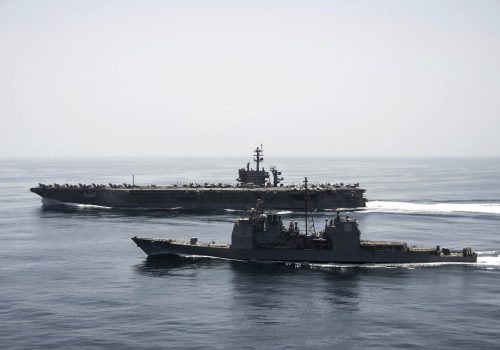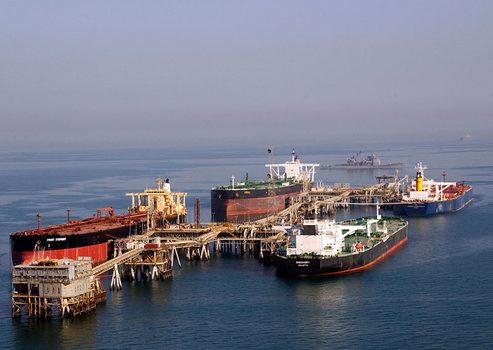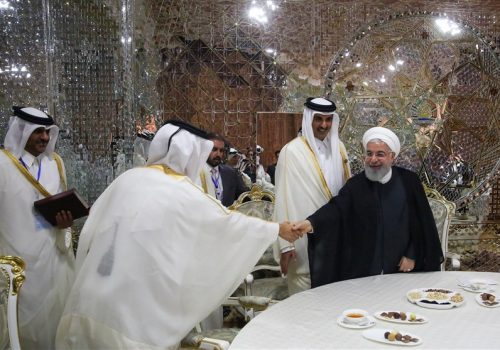To deter Iran, the Gulf states need stronger navies
If recent events in the ever-tumultuous Gulf have taught us anything, it’s that deterrence matters. A naval buildup will make an increasingly bellicose Tehran think twice about targeting merchant ships in the Gulf. For Saudi Arabia, the United Arab Emirates (UAE), and other Gulf monarchies, deterring Iran is a top national-security priority.
During 2019, a loss of deterrence had led Iran to conclude—accurately—that they could act with relative impunity. One example was the September 2019 strike on Saudi oil facilities at Abqaiq as well as the subsequent non-response. Two more came in the form of the brazen seizure of an unescorted British tanker and the downing of a US drone months prior. Killing Quds Force Commander Qasem Soleimani on January 3, however, restored deterrence by showing Iran that the United States can and will use force in the face of Iranian aggression. The Gulf states should follow Washington’s lead in restoring deterrence in the face of the desperate regime in Tehran. To achieve this objective, the Gulf states must invest much more in their own navies.
The Trump administration’s hands-off approach toward Iranian aggression in the Gulf should serve as a wake-up call for Arab countries. Although Washington has assumed the burden of defending Gulf waterways for decades, obituaries for the Carter Doctrine suggest that the Trump administration is not inclined to commit US ships there in perpetuity. This comes at a time when the US Navy has cut its shipbuilding budget even as it inches toward its goal of 355 vessels. What is more, the Indo-Pacific has become the most important theater for the US military—and particularly the navy—in response to China. The military brass will not be enthusiastic about devoting resources to purportedly peripheral US interests when many see the fleet as overextended. The writing is on the wall.
Add this to dwindling dependence on Middle Eastern oil at home and you have a recipe for US retrenchment in the Gulf. Those who say otherwise may point to the international coalition to protect commercial shipping in the Strait of Hormuz that Washington has cobbled together, which includes the UAE, Saudi Arabia, and Bahrain. Yet it’s unclear how far-reaching this commitment will be. Separately, the United Kingdom and Japan have dispatched warships to the region, but solely for their own merchant vessels. If the Gulf states expect other countries to provide all the naval support in their neighborhood, they would do well to reconsider that assumption.
Ensuring the free flow of their oil abroad remains a vital interest for the Gulf states. Strides toward economic diversification notwithstanding, these countries are still heavily dependent on their energy reserves. Like Iran—whose economy has been devastated by plummeting oil exports—they will suffer from restricted access to foreign markets. Yet who will protect the region’s shipping lanes if the United States withdraws?
It’s unlikely that another external power will contribute a significant naval presence to the Gulf in that scenario. Despite the vessels it has already sent, the United Kingdom is a greatly reduced maritime power and today imports relatively little Gulf oil. The same is true of Japan. France has some residual naval capability and is partly reliant on Saudi oil, but sending ships to Middle Eastern waters may be a bridge too far for Paris. India still lacks the means to project considerable naval power in the Gulf regardless of its oil interests there. That leaves China, which although possesses a massive fleet that may be eyeing the Gulf, does not yet have the appetite for serious military commitments in the Middle East.
All this means that the task of promoting free and open waters will largely fall to the Gulf states themselves. Their main adversary is well-armed—Tehran boasts not only a capable fleet but also a formidable missile arsenal that threatens all nearby enemy ships. Wedded to US security guarantees, the Gulf states have let their fleets atrophy to the point where the Saudi navy—arguably the region’s best—can muster just a handful of aging ships. This doesn’t inspire much confidence when confronted with Iran’s asymmetrical warfare and conventional naval capabilities. To counter this threat to their national security, the Gulf states should strengthen their own sea-based deterrence.
There’s some evidence that they have come around. Qatar reportedly will soon buy submarines, which would make it the second country in the Gulf after Iran with such vessels. Riyadh also inked an agreement with a French defense contractor last year covering submarines, while Abu Dhabi has shown similar interest. Submarine-armed Gulf states would provide a significant check on Iran’s sizable undersea fleet.
This is a good start, but the full answer includes corvettes, frigates, and unmanned vessels, as well as missile defense capabilities. The Saudis are on the right track through a naval modernization plan, but they have a long way to go before building an adequate fleet. The UAE must also do more, along with Kuwait, Bahrain, Qatar, and Oman. Their combined naval might would be enough to deter Iran from apprehending or striking merchant ships in the Strait of Hormuz. The Gulf states can either buy the necessary vessels from foreign shipbuilders or develop their own industries over the long term. A sensible solution would be to do both.
Indigenous naval capability may not be an easy answer in a region whose military history is largely defined by ground and aerial warfare. Yet ensuring Gulf security today will take new approaches, however costly they may be. Failing to do so—while letting Iran have its way—could prove far costlier.
Daniel J. Samet is a program assistant for Middle East Programs at the Atlantic Council.
Image: Fleet replenishment oiler USNS Big Horn, amphibious assault ship USS Boxer, and fleet replenishment oiler USNS Tippecanoe transit the Arabian Gulf (Reuters)


